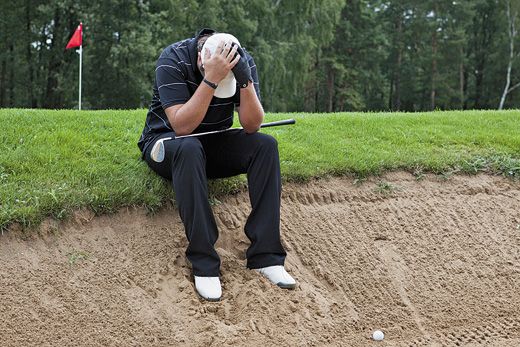The Science of Choking Under Pressure
With amateurs and pros clamoring for answers, a psychologist who studies screw-ups comes through in the clutch
/https://tf-cmsv2-smithsonianmag-media.s3.amazonaws.com/filer/FOB-Golfer-choking-631.jpg)
Thanks to Reebok commercials that aired before the 1992 Summer Olympics, America knew that Dan O’Brien could sprint 100 meters in 10.3 seconds and fling a discus 172 feet. But when the decathlete missed his three pole vault attempts at the trials, he became more famous for something else: choking.
“For half an hour, I walked around with my hands on my head, saying, ‘What just happened? Was that really my third attempt?’” says O’Brien, author of the new book Clearing Hurdles. He searched for his mom in the stands; he cried. “Somebody had to explain it to me: ‘Dude, you’re not going to the Olympics.’”
Sian Beilock, a University of Chicago psychologist and author of Choke, has dedicated her career to studying epic screw-ups. “Choking isn’t just poor performance. It is worse performance than you are capable of precisely because there is a lot on the line.”
Non-athletes choke, too—whether in the middle of a wedding toast or while parallel parking before a watchful spouse. Choking may be most painful in sports, where athletes bungle moves they’ve spent a lifetime perfecting.
The Olympics are a choking minefield, she says, because most athletes get only one shot. Seldom-televised sports like handball and canoe slalom are thrust before huge audiences, with medals and endorsement money at stake. The atmosphere of international goodwill only worsens the predicament: Studies show that the friendlier the audience, the more self-conscious players get.
Beilock lined a room in her lab with AstroTurf and asked golfers to swing on the makeshift green, creating pressure by offering money for good performance and introducing an audience, which pushes people to scrutinize their movements. Experts were about 20 percent less accurate on three- to five-foot putts. Golfers often choke when they think too much, Beilock says. Skilled athletes use streamlined brain circuitry that largely bypasses the prefrontal cortex, the seat of awareness. When outside stresses shift attention, “the prefrontal cortex stops working the way it should,” she says. “We focus on aspects of what we are doing that should be out of consciousness.”
Beilock recommends distracting the mind with meaningless details, like the dimples on a golf ball, or speeding up movements so the brain doesn’t have time to overthink. Under lab testing, golfers who moved more quickly improved their performance by a third.
For his part, Dan O’Brien reviewed the clip of his 1992 choke so many times that it no longer cluttered his mind, and when it screened on the Jumbotron at the 1996 trials, “I just kind of chuckled to myself,” he says. He not only made the team, he went on to win gold.
